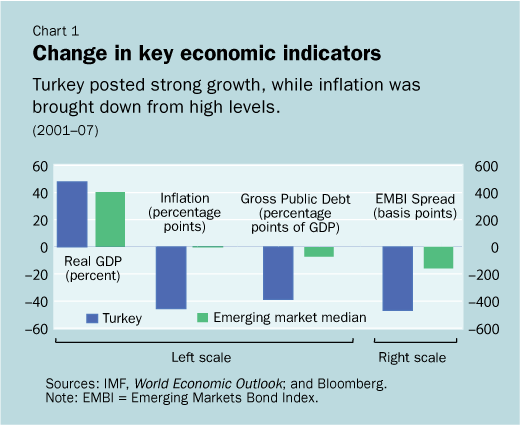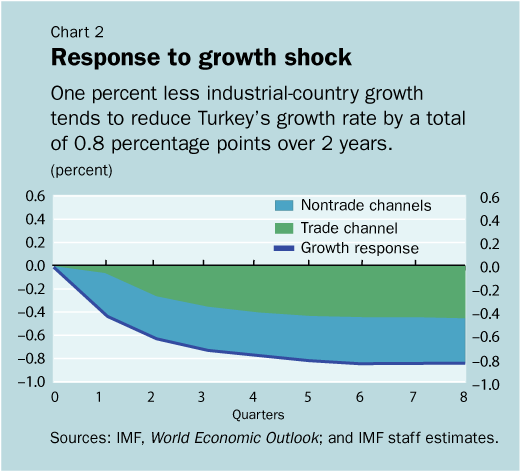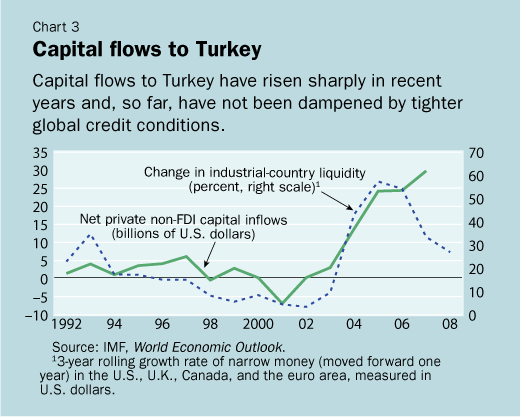
Typical street scene in Santa Ana, El Salvador. (Photo: iStock)
IMF Survey: Turkey—Navigating Through Choppier Waters
May 9, 2008
- After strong performance over past six years, Turkey's economy faces more challenging times
- Global developments creating headwinds for growth, inflation, and external financing
- Macroeconomic discipline and reform will help Turkey stay on course
Turkey's economy has performed well since the 2001 crisis, but is now facing less favorable external conditions.

Shopping in Istanbul's Grand Bazar: Turkey's inflation has started to edge up. (photo: Louisa Gouliamaki/AFP)
Thanks to good policies and a benign external environment, Turkey has experienced six years of strong and stable economic performance, including in comparison to its emerging market peers (see Chart 1).
More recently, however, the global environment has turned decidedly less favorable. The financial crisis that originated in the U.S. mortgage market has caused a broader tightening of credit conditions and dimmed prospects for world growth, while record-high commodity prices are fueling global inflationary pressures. These trends have also started affecting the Turkish economy.

Clouds on horizon
High global prices for energy and food, combined with the effects of a domestic drought, have recently pushed up Turkish consumer price inflation to 9¾ percent. The risk is that these shocks might cause broader-based price pressures, significantly delaying convergence to the official 4 percent inflation target.
The same adverse supply shocks have also slowed Turkey's economic growth in recent months. Growth is projected to slip to 4.0 percent in 2008 from 4.5 percent last year and 6.9 percent in 2006.
Near-term prospects are further clouded by the expected slowdown in global economic activity: IMF staff research suggests that a 1 percentage point reduction in industrial-country growth tends to reduce Turkey's growth by a cumulative 0.8 percentage points over two years (see Chart 2). Under current conditions, however, this impact should be mitigated somewhat by the continued dynamism of other emerging markets, whose share in Turkey's total exports has risen from 20 percent to 26 percent over the past three years alone.

Financial market headwinds
According to the IMF research, only about half of the total spillover from industrial-country growth comes via the trade channel. This points to an important role for financial transmission channels. Indeed, Turkish asset prices have tended to respond more strongly to global market fluctuations than any other large emerging market.
In this context, the ongoing tightening of global credit conditions poses a particular challenge given Turkey's large external financing requirement—about 17½ percent of GDP in 2008. Judging from historical trends, tighter global liquidity would normally entail reduced capital inflows for Turkey, although data for the last two years point to some decoupling (see Chart 3).

On the positive side, the composition of Turkey's external financing has clearly improved in recent years, with FDI inflows surging to unprecedented levels and covering half of the current account deficit in 2007. Moreover, Turkey's stock of gross external debt (34 percent of GDP) is actually lower than in many other emerging markets.
IMF loan review
The IMF Executive Board on May 9 completed the seventh and final review under the three-year SDR 6.66 billion (about $10.8 billion) Stand-By Arrangement for Turkey. The completion of this review enables Turkey to draw immediately the remaining balance under the arrangement, equivalent to $3.65 billion.
This reflects a sharp strengthening of public sector balance sheets, which has been partly offset by an increase in private sector external debt, due to extensive corporate borrowing.
Weatherproofing the economy
In many ways, Turkey today is in a much stronger position to cope with external headwinds than throughout its entire pre-2001 history. Under the auspices of two consecutive Stand-By Arrangements with the IMF—the latest one expires on May 10—the authorities achieved an impressive fiscal consolidation, built up large foreign exchange reserves, granted independence to the central bank and introduced inflation targeting, advanced privatization, and undertook important reforms, notably in social security, tax administration, and the banking sector.
Nonetheless, the current difficult environment poses a challenge for short-term macroeconomic policies in Turkey as in many other emerging markets. The Turkish authorities are trying to balance growth concerns with the need to ensure disinflation and external adjustment. The chosen policy mix leaves little margin for error. In particular, following last year's fiscal slippages, it will be critical to stick closely to this year's fiscal target (a primary surplus of at least 3.5 percent of GDP) and engineer a gradual tightening of monetary policy over the coming months.
The medium-term journey
Looking beyond the current cycle, Turkey's medium-term challenge is to combine continued macroeconomic policy discipline (close adherence to the announced medium-term fiscal path and convergence to the 4 percent inflation target) with the right set of microeconomic reforms to increase the economy's resilience to shocks while boosting potential growth. As detailed in an earlier IMF Survey article, the IMF has recommended action in four main areas:
• enhancing the institutional framework for fiscal policy by adopting a fiscal rule;
• making labor markets more flexible;
• addressing bottlenecks in electricity supply; and
• deepening financial intermediation.
Together, these reform steps would help generate fiscal space to lower high marginal tax rates, create jobs, reduce informality, and raise productivity, thus affording higher living standards on a sustained basis.
Comments on this article should be sent to imfsurvey@imf.org


